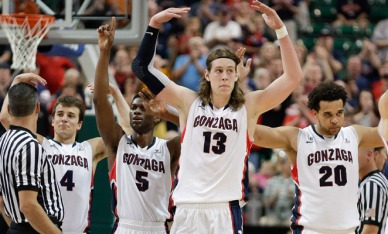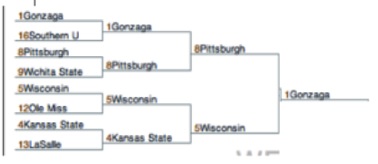There is something beautiful about the start of the tournament, with your bracket made and still having the possibility of achieving a perfect score. You get to see all the possible points on the board, no red lines, no disappointment. Last year, however, I didn’t have that luxury, as I had made my bracket with a contradiction.
I had Pittsburgh knocking off Gonzaga in the Round of 32 yet also had Gonzaga advancing to the Elite 8. First, let me say that a general rule of thumb is that if you have a team losing in a Round of 32 game, you shouldn’t have them suddenly reappearing in the Elite 8. I’m here to tell you, however, that there can be circumstances where it might be the best option to make a contradiction, and thus, an unwinnable bracket.
Anyway, here’s what that area of the bracket looked like for me last year:
I know what you’re saying: this is stupid. Not only does it look ugly, but it can’t possibly work out the best mathematically. However, here’s the thought process. Gonzaga came into the tournament with a huge question mark on its back. That is, were they capable of playing as well against stronger competition from bigger conferences? They were a higher variance team coming into the tournament. I felt that they could either live up to their regular season hype and go decently far in the tournament, or that they could get knocked off early by a mediocre opponent.
Additionally, Pitt was somewhat of an under-seeded 8 seed and a team that I liked a lot. Of course, in my mind, I didn’t believe that Pitt would win over Gonzaga more than 50% of the time, but I did know that I was significantly more confident in Pittsburgh than the average bracket maker,and less confident in Gonzaga in that matchup. I felt that picking Pittsburgh could end up being a move that could potentially establish the variance needed for defeating others (following the consensus picks becomes less likely to win a pool the larger a bracket pool gets) in a bracket.
If Gonzaga could knock off a very good Pittsburgh team, however, I don’t think that there would be any question that they would be able to defeat Wisconsin or Kansas (teams I liked even less than Pitt) in the Sweet Sixteen. Additionally, from a purely probabilistic standpoint, looking at all eight of these teams in this area of the bracket, I felt that Gonzaga had the largest overall probability of advancing to the Elite Eight.
In a purely winnable bracket, you would be unable to reconcile these two choices, and I would have had to make a decision between which one I valued more. However, I felt that instead of going for a “purely” made bracket, I would rather pick a bracket that could potentially be point maximizing and give me a better chance to win the competition I am in. Of course, my thought process in no way translated into actual points in my league, with Wichita State absolutely destroying everybody’s bracket in this region, but I firmly believe that making an impossible bracket can end up being the correct choice under the perfect circumstances.
If I hadn’t liked Pitt as much as a I did, or didn’t think that Gonzaga was as high variance a team, I probably would have just had Gonzaga winning the Round of 32 matchup and avoided contradiction. A lot of the time, it will be left up to the individuals making the bracket to know when it would be best to select an unwinnable bracket, but as a tool, don’t be afraid to use it if you feel it could end up being the best point maximizing move.
Obviously, don’t follow my bracket making advice if you want to win a billion dollars from Warren Buffett (although as another bracketology tip, you’re not going to win it anyway), but making an illogical bracket, for as rare and outlandish as it is, has the potential to be the right and most logical choice.
Images courtesy of ESPN, Sports Illustrated
Xavier Weisenreder
Georgetown University Class of 2016
Follow Xavier on Twitter: @BeMoreChillNext
Follow GSABR on Twitter: @GtownSports
Like GSABR on Facebook

